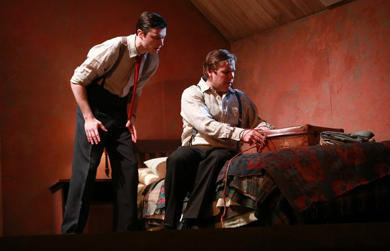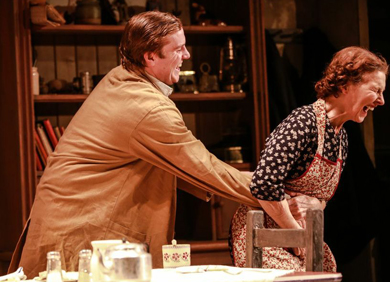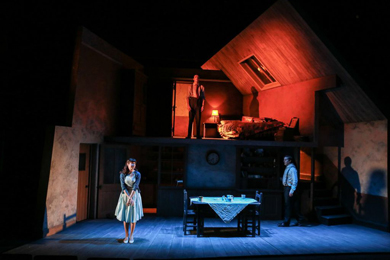Philadelphia, Here I Come! expertly directed by Andrew Flynn, is undoubtably one of Brian Friel’s major works and it has been well received at the Lyric Theatre in Belfast by enthusiastic audiences.
[caption id="attachment_47125" align="alignleft" width="390"] The Private and Public Gars engage in their psychological interchange in Philadelphia, Here I Come![/caption]
The Private and Public Gars engage in their psychological interchange in Philadelphia, Here I Come![/caption]
Written in 1964, Philadelphia addressed a key issue in Irish society… immigration. But his play goes far beyond a simple exploration of immigration to the US and delves into the relationship of the main character Gar (Gareth O’Donnell) with his father, SB O’Donnell … in Friel fashion, we as an audience are left wondering what ‘SB’ stands for… (is it an Americanism for ‘son-of-a bitch?’)
Set in the imaginary rural Irish town of Ballybeg, the action is focused around the last evening that 25-year old Gar spends in his home-cum-family business.
Friel employs a very effective device of splitting his main character, both Dublin-based actors, into two parts, Public Gar (Gareth O’Donnell) played by Peter Coonan and the Private Gar played by Gavin Drea. This mechanism allows two physical characters to inhabit the stage at the same time and showing the interplay between the main character’s conscious and unconscious mind while they engage with SB hiding behind his emotional wall.
[caption id="attachment_47126" align="alignright" width="390"] The Public Gar enjoys the craic with Madge in the kitchen.[/caption]
The Public Gar enjoys the craic with Madge in the kitchen.[/caption]
Private Gar is in fact an alter ego for Gareth, and this device creates a very credible dramatic tension in this psychological interchange. There was even something in the slimmer, gaunt figure of Private Gar through actor Gavin Drea from the inner world of psychodynamic impulses that contrasted with the more worldly, robust presence of Public Gar. In this way the action of the play operates often at a psychological and pubic level co-terminously.
From the opening scene of Gar Public finishing his last shift in his father’s village shop, immediately the question is begged, why is he not packing or saying goodbye to all his friends and relations? Instead he is going through the ritual and routine that his emotionally repressed father has set… right up to the last minute before his departure to America heightening the emotional abyss that exists between father and son.
[caption id="attachment_47127" align="alignleft" width="390"] SB O’Donnell could never engage at an emotional level with his son, Gareth, embodied in the Public and Private characters.[/caption]
SB O’Donnell could never engage at an emotional level with his son, Gareth, embodied in the Public and Private characters.[/caption]
Public Gar projects himself as a young man willing to embrace a new and exciting prosperity and freedom in America. He has worked with his father in the shop doing work at his command, with little personal development or reward or recognition. Public Gar occasionally resonates musically the buoyancy of life in America in singing ‘Philadelphia, Here I Come!‘… which is a take from Al Jolson’s ‘California, Here I Come!‘
Public Gar fatasises about the land of opportunity equal to all and the more he is driven to go, the more his uncouscious is tugging at him to stay. The melancholic music of ‘She danced through the fair’ acts as a counterpoint to the upbeat Hollywood-styled music fronting the good life in America. His failed love life too reflects another dimension of life in rural Ireland for many batchelors.
‘Screwball’, played by Des McAleer, as he calls his father, comes across as a man who cannot express his inner emotions either to his son or wife Madge. His domineering relationship to his housekeeper too is symbolic of the values of the time when women had a more inferior status is Irish society. Madge buzzes around making tea and doing house-hold menial chores, but it is his father that Gar is emotionally engaged with although he respons to Madge’s more motherly touch. This dimension gives the play an edge in the time-tried tradition from the Greek drama Oedipus Rex and even Shakespeare’s Hamlet. The relationship between father and son in Philadelphia gives a reason to go, and a reason to stay, as Private Gar fears the separation from his roots of family relationships and from his friends. The scene early in the play where father and son sit at the supper table shows there is an symbolic emotional gulf between them embodied by the physical space across teh table. They are ‘estranged’. This contrasts with the cue offered when Public Gar tickles Madge affectionately, being in her personal space.
[caption id="attachment_47128" align="alignright" width="390"] The set in the traditional Irish home in Ballybeg was well designed by Owen McCarthaigh.[/caption]
The set in the traditional Irish home in Ballybeg was well designed by Owen McCarthaigh.[/caption]
It is these relationships that deterministically have defined Gar as a person and as he tries to pull away from his origins and leave, he is forced into a world in inner guilt, anxiety and chaos.
The set by Owen MacCarthaigh worked well with the upper level providing the scene for much of the psycholigical exchange between the Private and Public Gar. And the kitchen downstairs which led into the shop was the arena for playing out the set piece, unemotional family relationships notably between gar and his father, a man obsessed with the minutiae of his small family business.
It was interesting too that Marty Maquire who was playing double roles along with Niall Cusack had lived in Los Angeles for twenty years working in drama and film. For him, this play must have had a special emotional resonance.
I have trodden the boards in a manner of speaking with Brian Friel… it was at my graduation ceremony at QUB in 1992 in the Whitla Hall. He was receiving an honorary degree for his contribution to the arts and was seated on stage when I received my very much humbler BA degree in politics. I had heard of him as a giant of Irish drama, but it was years later that I actually saw his plays and also met the ageing and quiet man briefly in his native surroundings in Greencastle in Donegal. Although declining in years, it was when I caught his eye I suddenly recognised in that moment a sparkle, full of energy and interest in life, an impish humour, deep insight, and possessing a genuine humanity, that I realised Brian Friel certainly deserved all the honours he has received in his lfetime, and more.
Philadelphia, Here I Come! is in a similar genre of such plays as Many Young Men of Twenty Said Goodbye (1961) by John B Keane when the Irish stage and literature was exploring society’s unfolding social identity with writers such as Brendan Behan. Even today, Philadelphia has a unique resonance reflecting the turmoil that many young men must have gone through along with their families. Celebrating the ‘Irish wake’ was one way of dealing with the sorrow and loss of a loved one travelling over the Atlantic to America probably never to be seen again. But even Gar shies away interestingly from the celebration of a last night on the town with his friends.
The play focussed on a process of bereavement and what Friel is addressing in Philadelphia reflected in the counterpoint of the relationship betweeen father and son and also his relationship with Madge to a lesser extent, and Gar’s great moral, social, personal and even sexual rebirth in America. It is a complex play, innovative, insightful, entertaining, and relevant today even fifty years on from the year it was written.
The problem of the ‘undocumented Irish’ still remains, but trans-Atlantic travel and the Internet has lessened the sense of absolute loss and alienation that existed back then when a family member chose to make a new life in America. The play has therefore that added level of significance in that we can compare the experience of the someone moving to live and work America to that of the more permanent separation in days gone by.
Although the pace of movement in the second half seems to slow down on the stage, I found Philadelphia! very engaging as it was a psychological drama as much as a critique about the state of Irish society and emigration in the early sixties. It’s certainly a play you need to prepare for as it is very rich in intellectual meaning as the parallel themes of emigration as an Irish experience, and the very much Freudian psychological and social relationships unfold.
Definitely a play that has to be seen… and thought about! Don’t miss it!
‘Philadelphia, Here I Come!’ runs until 8 March at the Lyric Theatre.
telephone: box office – 028 90 381081
]]>

























